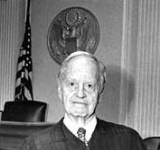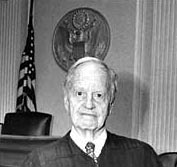
Knapp Commission
Encyclopedia
The Knapp Commission stemmed from a five-member panel initially formed in April 1970 by Mayor John V. Lindsay to investigate corruption within the New York City Police Department
. The creation of the commission was largely a result of the publicity generated by the public revelations of police corruption made by Patrolman Frank Serpico
and Sergeant David Durk.
) began its investigation of corruption in the police department in June 1970, public hearings didn't start until October 18, 1971. In addition to the testimony of lamplighters Serpico and Durk, testimony from dozens of other witnesses, including former Police Commissioner Howard R. Leary, corrupt patrolmen and the victims of police shakedowns, were heard.
As an immediate result of the testimony of the witnesses, criminal indictments against corrupt police officials were handed down. Commissioner Patrick V. Murphy, who was appointed by Mayor Lindsay shortly after the commission was formed to clean up the department, implement proactive integrity checks, massive transfers of senior personnel, job rotation in key areas, ensuring sufficient funds to pay informants, and cracking down on citizen attempts at bribery.
 On June 15, 1972, Whitman Knapp, Chairman of the Knapp Commission, was nominated as a Federal Judge for the Southern District of New York by President Richard M. Nixon.
On June 15, 1972, Whitman Knapp, Chairman of the Knapp Commission, was nominated as a Federal Judge for the Southern District of New York by President Richard M. Nixon.
The term "Grass Eaters" is used to describe police officers who "accept gratuities and solicit five, ten, twenty dollar payments from contractors, tow-truck operators, gamblers, and the like but do not pursue corruption payments." 'Grass eating' is something that a significant number of officers are guilty of, but which they learned to do so from other cops or from imitating the deviants they watch and investigate every day. The commission even concluded that 'grass eating' was used by police officers in New York City to prove their loyalty to the brotherhood, and with that came incentives like side jobs. One method of preventing cops from becoming corrupt is to eliminate this step by removing veteran cops who do this, without any veteran cops to learn this from, new officers might never decide to 'eat grass'.
"Meat Eaters" are officers who "spend a good deal of time aggressively looking for situations they can exploit for financial gain." An example of this is shaking down pimps and drug dealers for money not only for the material profit to the officers, but for the relief from guilt that the officers derive by convincing themselves that their victims deserve such treatment. They justify taking advantage of (these) criminals because they are considered the dregs of society."
New York City Police Department
The New York City Police Department , established in 1845, is currently the largest municipal police force in the United States, with primary responsibilities in law enforcement and investigation within the five boroughs of New York City...
. The creation of the commission was largely a result of the publicity generated by the public revelations of police corruption made by Patrolman Frank Serpico
Frank Serpico
Francesco Vincent Serpico is a retired American New York City Police Department officer who is most famous for testifying against police corruption in 1971...
and Sergeant David Durk.
Investigation and public hearings
While the Knapp Commission (named for its chairman, Whitman KnappWhitman Knapp
Percy Whitman Knapp was a federal judge who led a far-reaching investigation into corruption in the New York City Police Department from 1970 to 1972.-Childhood and education:...
) began its investigation of corruption in the police department in June 1970, public hearings didn't start until October 18, 1971. In addition to the testimony of lamplighters Serpico and Durk, testimony from dozens of other witnesses, including former Police Commissioner Howard R. Leary, corrupt patrolmen and the victims of police shakedowns, were heard.
As an immediate result of the testimony of the witnesses, criminal indictments against corrupt police officials were handed down. Commissioner Patrick V. Murphy, who was appointed by Mayor Lindsay shortly after the commission was formed to clean up the department, implement proactive integrity checks, massive transfers of senior personnel, job rotation in key areas, ensuring sufficient funds to pay informants, and cracking down on citizen attempts at bribery.
Whitman Knapp nominated as a Federal Judge

Recommendations of the Knapp Commission
The commission issued its preliminary report on August 15, 1972, and issued its final report on December 27, 1972. In its final report, the commission found widespread corruption in the New York City Police Department, and made the following recommendations:- commanders should be held accountable for their subordinates' actions.
- commanders should file periodic reports on key areas that would breed corruption.
- field offices of the Internal Affairs division should be created at all precincts.
- undercover informants should be placed in all precincts.
- improve screening and selection methods and standards.
- a change in police attitudes.
"Grass Eaters" and "Meat Eaters"
The Knapp Commission Report on Police Corruption identified two particular classes of corrupt police officer, which it called "Grass Eaters" and "Meat Eaters". This classification refers to petty corruption under peer pressure ("eating grass") and aggressive premeditated major corruption ("eating meat").The term "Grass Eaters" is used to describe police officers who "accept gratuities and solicit five, ten, twenty dollar payments from contractors, tow-truck operators, gamblers, and the like but do not pursue corruption payments." 'Grass eating' is something that a significant number of officers are guilty of, but which they learned to do so from other cops or from imitating the deviants they watch and investigate every day. The commission even concluded that 'grass eating' was used by police officers in New York City to prove their loyalty to the brotherhood, and with that came incentives like side jobs. One method of preventing cops from becoming corrupt is to eliminate this step by removing veteran cops who do this, without any veteran cops to learn this from, new officers might never decide to 'eat grass'.
"Meat Eaters" are officers who "spend a good deal of time aggressively looking for situations they can exploit for financial gain." An example of this is shaking down pimps and drug dealers for money not only for the material profit to the officers, but for the relief from guilt that the officers derive by convincing themselves that their victims deserve such treatment. They justify taking advantage of (these) criminals because they are considered the dregs of society."
See also
- Whitman KnappWhitman KnappPercy Whitman Knapp was a federal judge who led a far-reaching investigation into corruption in the New York City Police Department from 1970 to 1972.-Childhood and education:...
- Frank SerpicoFrank SerpicoFrancesco Vincent Serpico is a retired American New York City Police Department officer who is most famous for testifying against police corruption in 1971...
- SerpicoSerpicoSerpico is a 1973 American crime film directed by Sidney Lumet. It is based on the true story of New York City policeman Frank Serpico, who went undercover to expose the corruption of his fellow officers, after being pushed to the brink at first by their distrust and later by the threats and...
- Mollen CommissionMollen CommissionThe Mollen Commission is formally known as The City of New York Commission to Investigate Allegations of Police Corruption and the Anti-Corruption Procedures of the Police Department. Former judge Milton Mollen was appointed in July 1992 by then New York City mayor David N. Dinkins to investigate...
- Royal Commission into the New South Wales Police ServiceRoyal Commission into the New South Wales Police ServiceThe Royal Commission into the New South Wales Police Service was held in the State of New South Wales, Australia between 1995 and 1997. The Royal Commissioner was Justice James Roland Wood...
in Australia, held from 1994-1997. - PolicePoliceThe police is a personification of the state designated to put in practice the enforced law, protect property and reduce civil disorder in civilian matters. Their powers include the legitimized use of force...
- Police corruptionPolice corruptionPolice corruption is a specific form of police misconduct designed to obtain financial benefits, other personal gain, or career advancement for a police officer or officers in exchange for not pursuing, or selectively pursuing, an investigation or arrest....
- Political corruptionPolitical corruptionPolitical corruption is the use of legislated powers by government officials for illegitimate private gain. Misuse of government power for other purposes, such as repression of political opponents and general police brutality, is not considered political corruption. Neither are illegal acts by...
- Police brutalityPolice brutalityPolice brutality is the intentional use of excessive force, usually physical, but potentially also in the form of verbal attacks and psychological intimidation, by a police officer....
- New York City Police CommissionerNew York City Police CommissionerThe New York City Police Commissioner is the head of the New York City Police Department, appointed by the Mayor of New York City. Governor Theodore Roosevelt, in one of his final acts before becoming Vice President of the United States in March 1901, signed legislation replacing the Police Board...
Further reading
- Barker, T. (1978) An Empirical Study of Police Deviance Other Than Corruption. Journal of Police Science and Administration 6(3): 264-72.
- Barker, T. & D. Carter (1990) Fluffing Up the Evidence and Covering Your Ass: Some Conceptual Notes on Police Lying. Deviant Behavior 11: 61-73.
- Barker, T. & D. Carter (Eds.) (1994) Police Deviance. Cincinnati: Anderson. ISBN 978-0870847141
- Braziller, G. (Ed.) (1972) The Knapp Commission Report on Police Corruption. New York: George Braziller.
- Chin, G. (Ed.) (1997) New York City Police Corruption Investigation Commissions. New York: William S. Hein & Co. ISBN 978-1575882116
- Gabriel J. ChinGabriel J. ChinGabriel Jack Chin is an author, legal scholar, and Professor at the University of Arizona James E. Rogers College of Law. Chin is the Chester H. Smith Professor of Law and co-director of the Program in Criminal Law and Policy at the James E. Rogers College of Law, and Professor at the School of...
and Scott Wells, The "Blue Wall of Silence" as Evidence of Bias and Motive to Lie: A New Approach to Police Perjury, 59 University of Pittsburgh Law Review 233 (1998). - DeLattre, E. (5th ed. 2006) Character and Cops: Ethics in Policing. Washington DC: AEI Press. ISBN 978-0844742175
- Dershowitz, A. (1996) Reasonable Doubts. New York: Simon & Schuster.
- Kania, R. & W. Mackey (1977) Police Violence as a Function of Community Characteristics Criminology 15: 27-48.
- Kappeler, V., R. Sluder & G. Alpert (1994) Forces of Deviance: Understanding the Dark Side of Policing. Prospect Heights, IL: Waveland Press.
- Kleinig, J. (1996) The Ethics of Policing. New York: Cambridge Univ. Press.
- Sherman, L. (1974) Police Corruption: A Sociological Perspective. Garden City, NJ: Doubleday.
- Trautman, N. (1997) The Cutting Edge of Police Integrity. FL: Ethics Inst.

